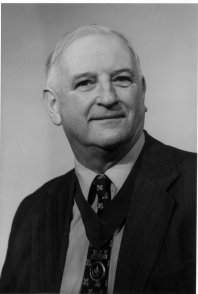We all called him “Bobby”. It seemed to fit, somehow, with his larger than life personality, his boyish laugh and his sense of fun.
It was easy to forget that he was an eminent physician and a deeply religious man.
Educated in Winchester, at King’s College Cambridge, and at Guy’s, Bobby kept friends and colleagues from all these stages of his life into old age. His marriage to Peggy, whom he met when she was a nurse at Guy’s, was a long and happy one and their three sons and four daughters kept in regular touch with them even when the family were scattered all over the globe. It was Catherine, their daughter who was a practice manager in Guernsey, who organised the family gatherings, especially after Bobby and Peggy retired to Guernsey (where Peggy had been brought up). He was very proud of his 17 grandchildren and, at the last count(!) 3 great grandchildren.
After serving in the RAMC as a Regimental Medical Officer between 1945 and 47, Bobby returned to medical posts at the Brompton and at Guy’s and later moved to Newcastle-on-Tyne in 1952, as a senior registrar in general medicine. At that time, 40 applicants competed for each consultant post in general medicine and even excellent candidates like Bobby were unable to find appointments.
Like several other outstanding physicians, and after an energetic apprenticeship in the specialty under Dr Elunet Woodford-Williams in Sunderland, Bobby made the decision to move into geriatric medicine. On his appointment to Hastings, he transformed the service there from a primarily long stay one to a unit with active acute and rehabilitation wards and a day-hospital.
Bobby was committed to teaching, and became the first clinical tutor to Hastings, helping to establish its postgraduate centre and regular clinical meetings. Senior registrars from other centres were invited to give lectures, spend the night at his home, and perhaps see something of the working of the innovative orthopaedic-geriatric ward. There, he and his orthopaedic colleague, Michael Devas, combined their expertise to ensure that patients recovered as quickly as possible from their hip fractures. They achieved discharge rates unheard of at that time.
Co-operating with colleagues in other disciplines gave Bobby his keenest pleasures at work, and resulted in some of his most enduring publications. With the therapists and social worker in Hastings Day Hospital, he published “The Older Patient”, which was still in print after 20-odd years. He represented the British Geriatrics Society in a combined report with the Royal College of Nursing, “Improving Geriatric Care in Hospital”, in 1975 and its sequel in 1987. He was in demand to provide chapters in a number of textbooks of geriatric medicine and was adviser to the Department (DHSS) on geriatric medicine from 1982 -5. Despite the volume and quality of his work for the specialty, Bobby was genuinely surprised to be asked to become President of the British Geriatrics Society from 1981-1984. He filled his role with distinction and his customary bonhomie, and his career was crowned by the award of the CBE for “services for elderly people”.
It was typical of Bobby that he chose to leave his cancer untreated, and to die from that, rather than from his multi-system atrophy, which involved untreatable Parkinsonian symptoms. His last Christmas letter (and he knew it would be his last), was full of thankfulness for his many blessings at work and in his family life and friendships, and he was sure he would see his dear Peggy again. A great man.
Marion Hildick-Smith
BGS President 1988 – 1990
